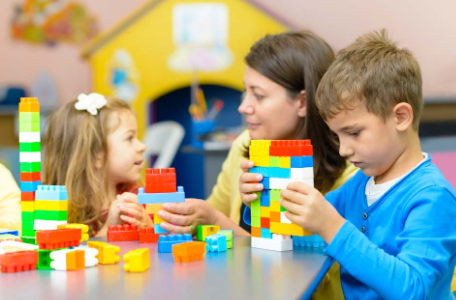
Where Learning Begins Through Play and Exploration
Choosing the right environment for your child’s early development is one of the most significant decisions a parent can make. You want a space where they feel safe, nurtured, and inspired to learn. Many parents believe that structured lessons and academic drills are the keys to a bright future. However, decades of child development research point to a more natural and profoundly effective method: learning through play.
This guide will explore why play and exploration are the cornerstones of early childhood education. We’ll look at how these seemingly simple activities build essential cognitive, social, and emotional skills that create a strong foundation for lifelong learning. Understanding the power of play will empower you to recognize a high-quality learning environment where your child can truly flourish.
The Science of Learning Through Play
Play is often seen as a break from learning, but for young children, it is the most important work they do. When children engage in play, their brains are buzzing with activity. They are experimenting with ideas, solving problems, and making sense of the world around them. This active, hands-on approach is far more effective than passively receiving information.
Neurological studies show that play stimulates the growth of the prefrontal cortex, the part of the brain responsible for executive functions like planning, decision-making, and emotional regulation. When a child builds a tower of blocks, they are learning about gravity and balance. When they engage in imaginative role-playing, they are developing empathy and communication skills. Every playful interaction is a learning opportunity, creating neural pathways that will support more complex academic tasks later on.
Key Benefits of a Play-Based Curriculum
A curriculum centered on play and exploration offers a wealth of benefits that go far beyond memorizing letters and numbers. It fosters holistic development, nurturing the whole child.
Fosters Creativity and Imagination
Imagination is the engine of innovation. A play-based environment provides children with open-ended materials like blocks, art supplies, and natural objects, allowing them to create anything they can dream up. A simple cardboard box can become a rocket ship, a castle, or a secret fort. This type of imaginative play encourages children to think outside the box, a skill that is invaluable in a rapidly changing world. It teaches them that there can be multiple solutions to a single problem and that their ideas have value.
Develops Social and Emotional Skills
Play is the primary way children learn to interact with their peers. During group play, they learn to negotiate, share, cooperate, and resolve conflicts. They practice taking turns, listening to others’ ideas, and expressing their own feelings in a safe and supportive setting.
For example, when children collaborate to build a sandcastle, they must communicate their vision and work together to achieve a common goal. If a disagreement arises, they have the opportunity to practice problem-solving and compromise. These experiences are fundamental to developing emotional intelligence, empathy, and the ability to form healthy relationships.
Encourages Critical Thinking and Problem-Solving
From figuring out how to make a block tower stand tall to determining the rules of a new game, play is filled with challenges that require critical thinking. Children learn to observe, experiment, and adapt their strategies when things don’t go as planned.
This process of trial and error builds resilience and a growth mindset. It teaches them that mistakes are not failures but opportunities to learn and try again. This foundation in problem-solving will serve them well in school and in life, enabling them to approach challenges with confidence and creativity.
Builds a Love for Learning
When learning is fun, children are naturally motivated to do more of it. A play-based approach connects learning with joy and curiosity, creating a positive association that can last a lifetime. Instead of feeling pressured to perform, children are empowered to follow their interests and explore topics that genuinely fascinate them.
If you are looking for a day care center near me in Casa Adobes Oro Valley that understands the importance of play, seek out a program that prioritizes exploration and child-led discovery. This passion for learning, ignited in early childhood, is the greatest gift we can give our children.
Your Child’s Next Chapter
Ultimately, the goal of early childhood education is not just to prepare children for kindergarten but to prepare them for life. By embracing play and exploration as the primary vehicles for learning, we equip our children with the skills, confidence, and curiosity they need to thrive. A play-based environment nurtures their natural love for learning and sets them on a path of discovery and growth.
When you invest in a learning environment that values play, you are giving your child the tools to become a creative thinker, a compassionate friend, and a confident problem-solver.




